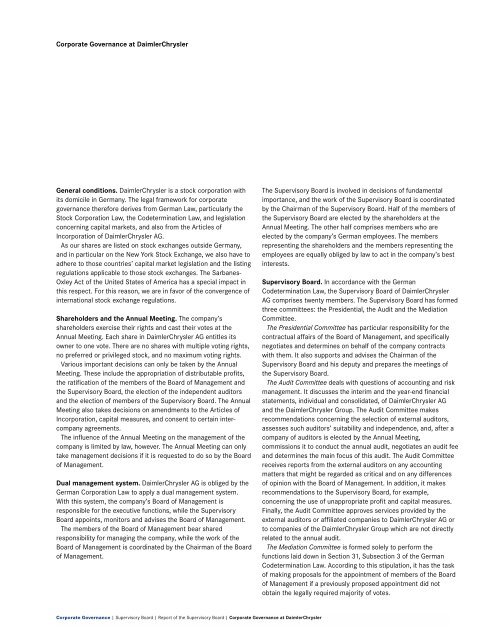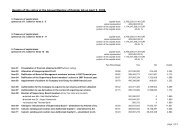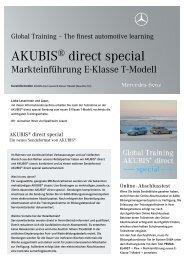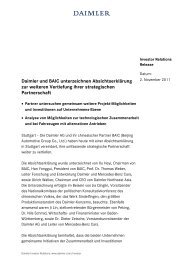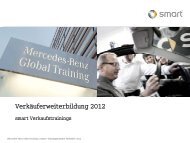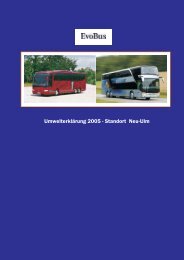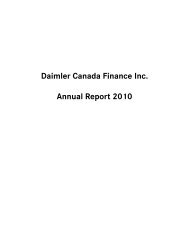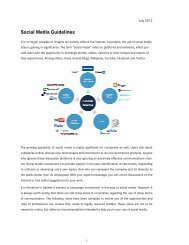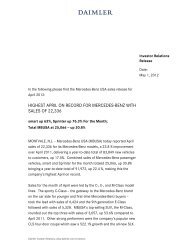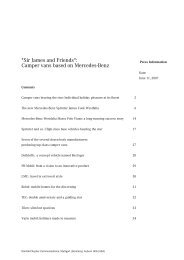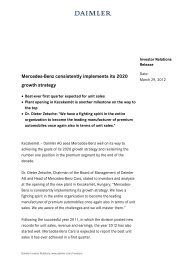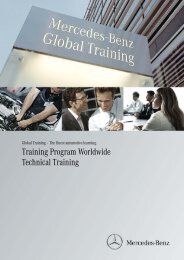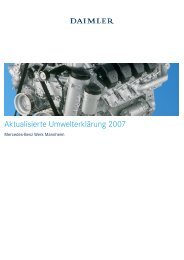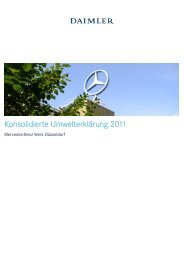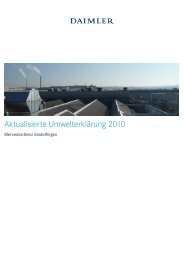Daimlerchrysler Annual Report 2003
Daimlerchrysler Annual Report 2003
Daimlerchrysler Annual Report 2003
Create successful ePaper yourself
Turn your PDF publications into a flip-book with our unique Google optimized e-Paper software.
Corporate Governance at DaimlerChrysler<br />
General conditions. DaimlerChrysler is a stock corporation with<br />
its domicile in Germany. The legal framework for corporate<br />
governance therefore derives from German Law, particularly the<br />
Stock Corporation Law, the Codetermination Law, and legislation<br />
concerning capital markets, and also from the Articles of<br />
Incorporation of DaimlerChrysler AG.<br />
As our shares are listed on stock exchanges outside Germany,<br />
and in particular on the New York Stock Exchange, we also have to<br />
adhere to those countries’ capital market legislation and the listing<br />
regulations applicable to those stock exchanges. The Sarbanes-<br />
Oxley Act of the United States of America has a special impact in<br />
this respect. For this reason, we are in favor of the convergence of<br />
international stock exchange regulations.<br />
Shareholders and the <strong>Annual</strong> Meeting. The company’s<br />
shareholders exercise their rights and cast their votes at the<br />
<strong>Annual</strong> Meeting. Each share in DaimlerChrysler AG entitles its<br />
owner to one vote. There are no shares with multiple voting rights,<br />
no preferred or privileged stock, and no maximum voting rights.<br />
Various important decisions can only be taken by the <strong>Annual</strong><br />
Meeting. These include the appropriation of distributable profits,<br />
the ratification of the members of the Board of Management and<br />
the Supervisory Board, the election of the independent auditors<br />
and the election of members of the Supervisory Board. The <strong>Annual</strong><br />
Meeting also takes decisions on amendments to the Articles of<br />
Incorporation, capital measures, and consent to certain intercompany<br />
agreements.<br />
The influence of the <strong>Annual</strong> Meeting on the management of the<br />
company is limited by law, however. The <strong>Annual</strong> Meeting can only<br />
take management decisions if it is requested to do so by the Board<br />
of Management.<br />
Dual management system. DaimlerChrysler AG is obliged by the<br />
German Corporation Law to apply a dual management system.<br />
With this system, the company’s Board of Management is<br />
responsible for the executive functions, while the Supervisory<br />
Board appoints, monitors and advises the Board of Management.<br />
The members of the Board of Management bear shared<br />
responsibility for managing the company, while the work of the<br />
Board of Management is coordinated by the Chairman of the Board<br />
of Management.<br />
Corporate Governance | Supervisory Board | <strong>Report</strong> of the Supervisory Board | Corporate Governance at DaimlerChrysler<br />
The Supervisory Board is involved in decisions of fundamental<br />
importance, and the work of the Supervisory Board is coordinated<br />
by the Chairman of the Supervisory Board. Half of the members of<br />
the Supervisory Board are elected by the shareholders at the<br />
<strong>Annual</strong> Meeting. The other half comprises members who are<br />
elected by the company’s German employees. The members<br />
representing the shareholders and the members representing the<br />
employees are equally obliged by law to act in the company’s best<br />
interests.<br />
Supervisory Board. In accordance with the German<br />
Codetermination Law, the Supervisory Board of DaimlerChrysler<br />
AG comprises twenty members. The Supervisory Board has formed<br />
three committees: the Presidential, the Audit and the Mediation<br />
Committee.<br />
The Presidential Committee has particular responsibility for the<br />
contractual affairs of the Board of Management, and specifically<br />
negotiates and determines on behalf of the company contracts<br />
with them. It also supports and advises the Chairman of the<br />
Supervisory Board and his deputy and prepares the meetings of<br />
the Supervisory Board.<br />
The Audit Committee deals with questions of accounting and risk<br />
management. It discusses the interim and the year-end financial<br />
statements, individual and consolidated, of DaimlerChrysler AG<br />
and the DaimlerChrysler Group. The Audit Committee makes<br />
recommendations concerning the selection of external auditors,<br />
assesses such auditors’ suitability and independence, and, after a<br />
company of auditors is elected by the <strong>Annual</strong> Meeting,<br />
commissions it to conduct the annual audit, negotiates an audit fee<br />
and determines the main focus of this audit. The Audit Committee<br />
receives reports from the external auditors on any accounting<br />
matters that might be regarded as critical and on any differences<br />
of opinion with the Board of Management. In addition, it makes<br />
recommendations to the Supervisory Board, for example,<br />
concerning the use of unappropriate profit and capital measures.<br />
Finally, the Audit Committee approves services provided by the<br />
external auditors or affiliated companies to DaimlerChrysler AG or<br />
to companies of the DaimlerChrysler Group which are not directly<br />
related to the annual audit.<br />
The Mediation Committee is formed solely to perform the<br />
functions laid down in Section 31, Subsection 3 of the German<br />
Codetermination Law. According to this stipulation, it has the task<br />
of making proposals for the appointment of members of the Board<br />
of Management if a previously proposed appointment did not<br />
obtain the legally required majority of votes.


